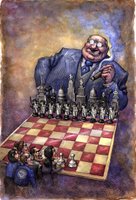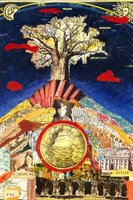 What's Democracy School?
What's Democracy School?The weekend-long workshop of lectures and discussion, to be conducted in Maryland, explores why democratic self-governance is impossible when corporations wield constitutional rights that deny people's rights. Participants discuss ways to be part of the multi-generational struggle to take away corporate "rights", much in the way people struggled to take away the "right" to own slaves.
The workshop covers the history of people's movements and corporate power. It covers case histories and ways in which local communities have challenged corporate "rights" and taken stpes to protect themselves from corporate harms. Instructor, Thomas Linzy, is an attorney from Pennsylvania who has helped local townships write ordinaces that challenge corporate power. He shares his first-hand experiences challenging the roots of corporate power, and explains how typcial citizens can take part.
 * Included with Democracy School are a 190-page notebook of background reading material, and a copy of Defying Corporations, Defining Democracy a book of history and strategy.
* Included with Democracy School are a 190-page notebook of background reading material, and a copy of Defying Corporations, Defining Democracy a book of history and strategy. * 3-Day Weekend Session (See Curriculum below)
* Date: Likely in January 2007
* Snacks and group meals are provided
* Location, in Maryland, is to be determined (check back to this site or E-mail me to be on my "interest list" gdaeman@yahoo.com).
* The cost is about $275 (final cost depends on how many people participate... Help Get The Word Out to Reduce the Cost!)
* If you're curious, and want to be considered, NO OBLIGATIONS, Contact gdaeman@yahoo.com
Curriculum
 Day 1, Evening (Friday)
Day 1, Evening (Friday)* Introductions of Attendees
* Discussion:
... o "What is Our Concept of Democracy?"
... o "What is Our History of Regulatory Activism?"
... o "Does Our Work Vindicate Our Concept of Democracy?"
* How We Got Here: A Brief Overview of the School and the Evolution of
POCLAD/CELDF
Day 2, All Day and Evening (Saturday w/ dinner)
* The Historical Role and Nature of Corporations in the United States
* The Role of Corporate Charters
* The Conferral of Corporate Constitutional Rights
* A History of Peoples' Movements in the United States
... o The American Revolution
... o The Articles of Confederation and the Constitution
... o The Anti-Federalists
... o The Populists
... o The Abolitionists and the Fourteenth Amendment
... o Womens' Rights and the Nineteenth Amendment
... o The Labor Movement
* What Have We Learned from These Movements?
* Common Theories, Strategies, and Actions
... o Theory of the Constitution
... o Theory of the Corporation
... o Theory of Democracy
* Building on the Lessons of Prior Movements
* Building New Models of Organizing
* The "Single Issue: Model: From Reframing to Winning"
* Driving into Local Governing Arenas
* Challenging and Contesting Corporations
... o Contesting Government Actions Empowering Corporations to Usurp Community Control From Reframing to Drawing the Corporate Response To Building New Constituencies To Winning
... o Altering the Odds: Directly Challenging Corporate Rights
... o The Porter Township, Clarion County Experience: Eliminating Legal Privileges Claimed by Corporations
Day 3, Morning (Sunday)
* Building the Connections Amongst All Single Issues
* Our History of Collaterally Challenging Illegitimate Corporate Authority
* Breakout: Reframing Single Issues by Rethinking Several Issues
* An Exploration of Jurisdictions and Arenas
* Other Constituencies
* Critical Mass: Doing it Together and Building a Movement
* This is the Work: Groups Across the United States Applying New Models
* Discussion: How Do We Make Real the Promises of Democracy?
 What's after Democracy School?
What's after Democracy School?Democracy Schools are not an end in themselves -- they are part of a growing movement to challenge corporate control of government and establishing more genuine self-governance in this country. Schools are just one step in brininging people together ot move communities to rights-based organizing.
There are a number of next steps to take, depending on local circumstances. One is to send speakers into the community, or sponsor more Democracy Schools, to educate others on rights-based organizing. Another is to develop strategies and tactics to defend against imminent or existing corporate harms. Organize a self-led, 10-session "Corporate Study Group" to read and discuss Materials on Challenging Corporate Power. Finally, see the many clever approaches used in other local communities referenced below, particualarly by CELDF and DUHC.
More Information About the Subject and Movement:
Community Environmental Legal Defense Fund (CELDF): Applying the principles in Pennsylvania.
Program on Corporations, Law & Democracy (POCLAD) The founding thinkers of the movement.
Democracy Unlimited of Humbolt County: One of the leading communities in this multi-generational struggle.



No comments:
Post a Comment